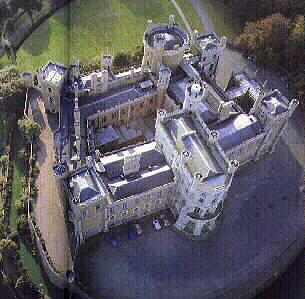de Meschines Family - Ourfolk
Mabel de Meschines (d'Albiny) B: ABT 1173
Mabel was born on ABT 1173 in Of, Cheshire, England .
She is the daughter of Earl of Chester Hugh of Kevelioc de Meschines (1147 - 30 JUN 1181) and Bertrade de Montfort (de Meschines) (1155 - 12 JUL 1189).
Mabel was married to William d'Albiny on Chester, Cheshire, England.
William was born on ABT 1165 in Arundel, Sussex, England and died on BEF 30 MAR 1221 in Cainell By Rome, Latium, Italy .
He was the son of Earl William d'Albiny (ABT 1140 - 24 DEC 1193) and Maud de Saint Hilary (de Clare) (1132 - 24 DEC 1193).
View Family Chart
- - -
| Parents | Grand Parents | |||||||||||||||||||||||||||||||||||||||||||||||||||||||||||||||||||||||||||||||||||||||||||||||||||
| ⌈ Ranulph de Meschines (1099 - 16 DEC 1153) | ||||||||||||||||||||||||||||||||||||||||||||||||||||||||||||||||||||||||||||||||||||||||||||||||||||
| ⌈ Earl of Chester Hugh of Kevelioc de Meschines (1147 - 30 JUN 1181) | ||||||||||||||||||||||||||||||||||||||||||||||||||||||||||||||||||||||||||||||||||||||||||||||||||||
| ⌊ Maud Fitzrobert (de Meschines) (ABT 1120 - 29 JUL 1189) | ||||||||||||||||||||||||||||||||||||||||||||||||||||||||||||||||||||||||||||||||||||||||||||||||||||
| Mabel de Meschines (d'Albiny) | ||||||||||||||||||||||||||||||||||||||||||||||||||||||||||||||||||||||||||||||||||||||||||||||||||||
| ⌈ Simon Ii Le Chauve de Montfort (ABT 1117/1121 - 13 MAR 1181) | ||||||||||||||||||||||||||||||||||||||||||||||||||||||||||||||||||||||||||||||||||||||||||||||||||||
| ⌊ Bertrade de Montfort (de Meschines) (1155 - 12 JUL 1189) | ||||||||||||||||||||||||||||||||||||||||||||||||||||||||||||||||||||||||||||||||||||||||||||||||||||
| ⌊ Countess Maud of Evreux (de Montfort) (B: ABT 1130) | ||||||||||||||||||||||||||||||||||||||||||||||||||||||||||||||||||||||||||||||||||||||||||||||||||||
When his father died he was in ward to King
Henry II and, in 1194, he was in the army of Richard I in Normandy. Already a wealthy man at the time of the
accession of John to the throne, he received several additional grants of great value. In 1201, when the Barons
refused to follow their Sovereign into France, King John demanded that their castles should be given up to him as
security for their allegiance, beginning with William d'Albini; and therewith Belvoir Castle, instead of which
d'Albini gave him his son, William, as a hostage.
William d'Albini was one of the King's foremost financial officers. Before 1200 he had been custodian sheriff, a
sort of tax collector and treasurer combined. After 1200 King John appointed him one of the justices or
'exchequers' of the Jews. As such he kept a record of all royal debts to Jews, and of payments made to them.
Possibly such an official settled disputes connected with money-lending operations. The Jews were a powerful
source of revenue, which the King desired to protect to his own interest. From Michaelmas 1210 to mid-Lent of
1211, William and five other Barons were in charge of customs duties on dyes and grain. In 1213 we find him
involved in a baronial investigation committee, which sought to unearth evidence of alleged embezzlements
charged to certain sheriffs.
Henry II and, in 1194, he was in the army of Richard I in Normandy. Already a wealthy man at the time of the
accession of John to the throne, he received several additional grants of great value. In 1201, when the Barons
refused to follow their Sovereign into France, King John demanded that their castles should be given up to him as
security for their allegiance, beginning with William d'Albini; and therewith Belvoir Castle, instead of which
d'Albini gave him his son, William, as a hostage.
William d'Albini was one of the King's foremost financial officers. Before 1200 he had been custodian sheriff, a
sort of tax collector and treasurer combined. After 1200 King John appointed him one of the justices or
'exchequers' of the Jews. As such he kept a record of all royal debts to Jews, and of payments made to them.
Possibly such an official settled disputes connected with money-lending operations. The Jews were a powerful
source of revenue, which the King desired to protect to his own interest. From Michaelmas 1210 to mid-Lent of
1211, William and five other Barons were in charge of customs duties on dyes and grain. In 1213 we find him
involved in a baronial investigation committee, which sought to unearth evidence of alleged embezzlements
charged to certain sheriffs.
Last change (on this page): 15 OCT 2018
